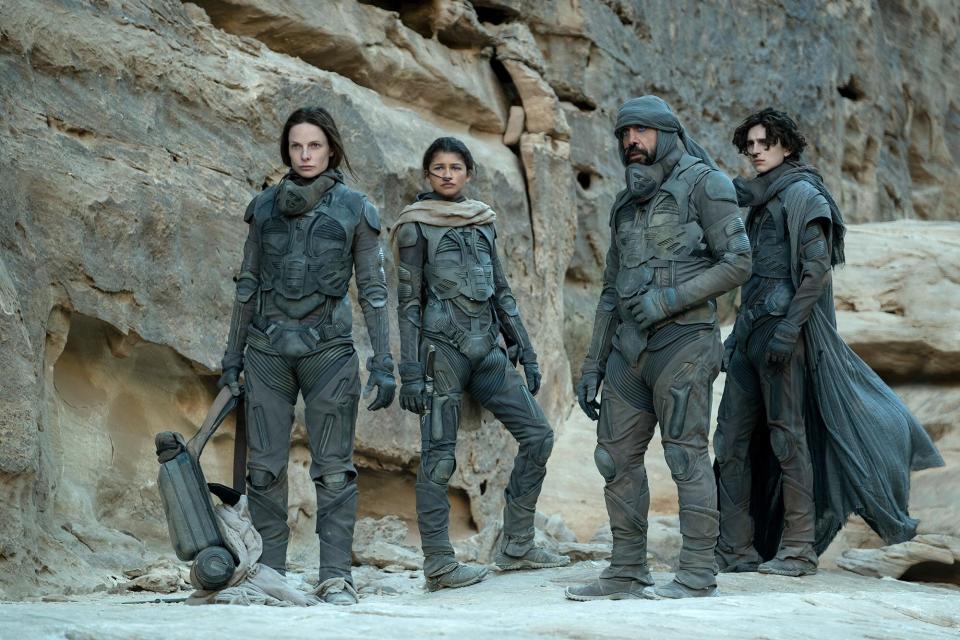Dune review: Denis Villeneuve's starry sci-fi epic is breathtaking, and a little bit maddening

- Oops!Something went wrong.Please try again later.
Earlier this summer, director Denis Villeneuve made news for insisting that watching Dune on television would be like "driv[ing] a speedboat in your bathtub." To some people, it sounded like the petty grievances of an out-of-touch auteur — or worse, a fundamental misunderstanding of the way post-pandemic Hollywood operates: any which way it can.
All that might be true, but it doesn't mean he's wrong. In fact Villeneuve's new adaptation of Frank Herbert's classic 1965 novel is exactly the kind of lush, lofty filmmaking wide screens were made for; a sensory experience so opulent and overwhelming it begs to be seen big, or not at all. That the movie (which premiered Friday at the Venice Film Festival, ahead of a theatrical and HBO Max release Oct. 22) seems to have room for only half the story — and that its emotional palate is considerably more limited than its artistic one — feels relative in many ways to the fandom. If you're already knee-deep in Herbert mythology, you'll thrill to every whispered word; if you come in not knowing the difference between a Holtzman shield and a hole in the floor, it's a longer walk.
The introduction, in any case, wastes little time on exposition: The year is 10191 and Duke Leto Atreides (Oscar Isaac) has come with his longtime concubine, Lady Jessica (Rebecca Ferguson) and their grown son, Paul (Timothée Chalamet), to oversee the colonized planet of Arrakis — a harsh, arid place whose lone prized export is a shimmery dust called Spice. The natives who manage to scrape out a subsistence living farming it there are known as Fremens, their Listerine-blue eyes and Mad Max-style compounds necessary adaptations to the unforgiving climate.

Chia Bella James/Warner Bros. Rebecca Ferguson, Zendaya, Javier Bardem, and Timothée Chalamet in 'Dune'
Paul is soon visited by dreams of one Fre-woman in particular, Chani (Zendaya), disturbing visions that come to him unreliably and often without context but seem to portend real future events. To Lady Jessica, a member of an ancient all-female order known as the Bene Gesserit Sisterhood, it's further proof that her child may in fact be the one chosen to save them all — centuries of selective eugenics finally come to bear in the body of a boy whose gender just happens to be wrong, or at least not what the Sisterhood planned for.
She's not the only one to take note of his particular gifts: The leader of Atreides' born enemy, the slug-bodied Baron Vladimir Harkonnen (Stellan Skarsgård) feels the ripple of his presence and the Fremens do too — even if loyal foot soldiers of his father's, including Josh Brolin's taciturn weapons master Gurney Halleck and Jason Momoa's cheerful warrior Duncan Idaho, continue to treat him like an essential if ordinary heir, to be trained and mentored and kept safe in the line of succession.
There are, you may have already sensed, no small actors in Dune, even in small parts: a veiled, imperious Charlotte Rampling as the Mother Superior who puts Paul to a memorable test; Javier Bardem as a terse Fremen chieftan; Dave Bautista as the Baron's brooding bull-necked nephew. Zendaya's Chani, who appears far more verbal in the trailer than she does in the actual film, moves through most of it as a sort of teasing apparition, less fully fleshed character than elusive spirit guide-slash-dream-key to Paul's destiny.
To be fair, it's hard to imagine a mortal movie star who wouldn't be dwarfed by the exquisite, elaborate world-building happening on screen. As he proved on projects like Arrival and Blade Runner 2049, Villeneuve's gift for visual storytelling can be genuinely breathtaking — vast desertscapes unscrolling like oceans and helicopters with dragonfly-wing blades where the rotors should be; the kidney-piercing resonance of Hans Zimmer's soundtrack poured over sets of towering, planet-scaled enormity. (Speculation that Dune's M.O. would be "Star Wars, but make it fashion" is not completely off-base.) If anything falls short of Herbert's particular vision it's the movie's sandworms, who for all their faceless foreboding mostly register as super-size CG tubes; colossal, unwieldy vacuum-cleaner attachments gone rogue.
Dune is so aesthetically rich and monolithic that a few brief, misguided stabs at Marvel-style humor early on feel almost like blasphemy. The script seems to know it and soon settles into a kind of grim grandeur, each turn a building block to nothing less than the interstellar fate of the free world. Chalamet aptly channels the ethereal beauty and conflicted psyche of a reluctant savior, his troubled, tender Paul a sort of sci-fi Hamlet forced by fate and circumstance to bear the full weight of history, and Isaacs' Duke is both a noble warrior and a father so lovingly supportive he belongs in the Call Me By Your Name dad hall of fame. At some point, it is virtually guaranteed that they and nearly everyone else on screen will appear in a visual tableau worth gasping over.
The sheer awesomeness of Villeneuve's execution — there might not be another film this year, or ever, that turns one character asking another for a glass of water into a kind of walloping psychedelic performance art — often obscures the fact that the plot is mostly prologue: a sprawling origin story with no fixed beginning or end. (The director has said that he only agreed to take on the project if the studio let him split Dune's narrative into two parts, and that he's still "very optimistic" the second will get made.) Minus the fuller context that Herbert's extended universe and dense mythology provides, the meaning of it all feels both endlessly beguiling and just out of reach: a dazzling high-toned space opera written on sand. Grade: B
Related content:

